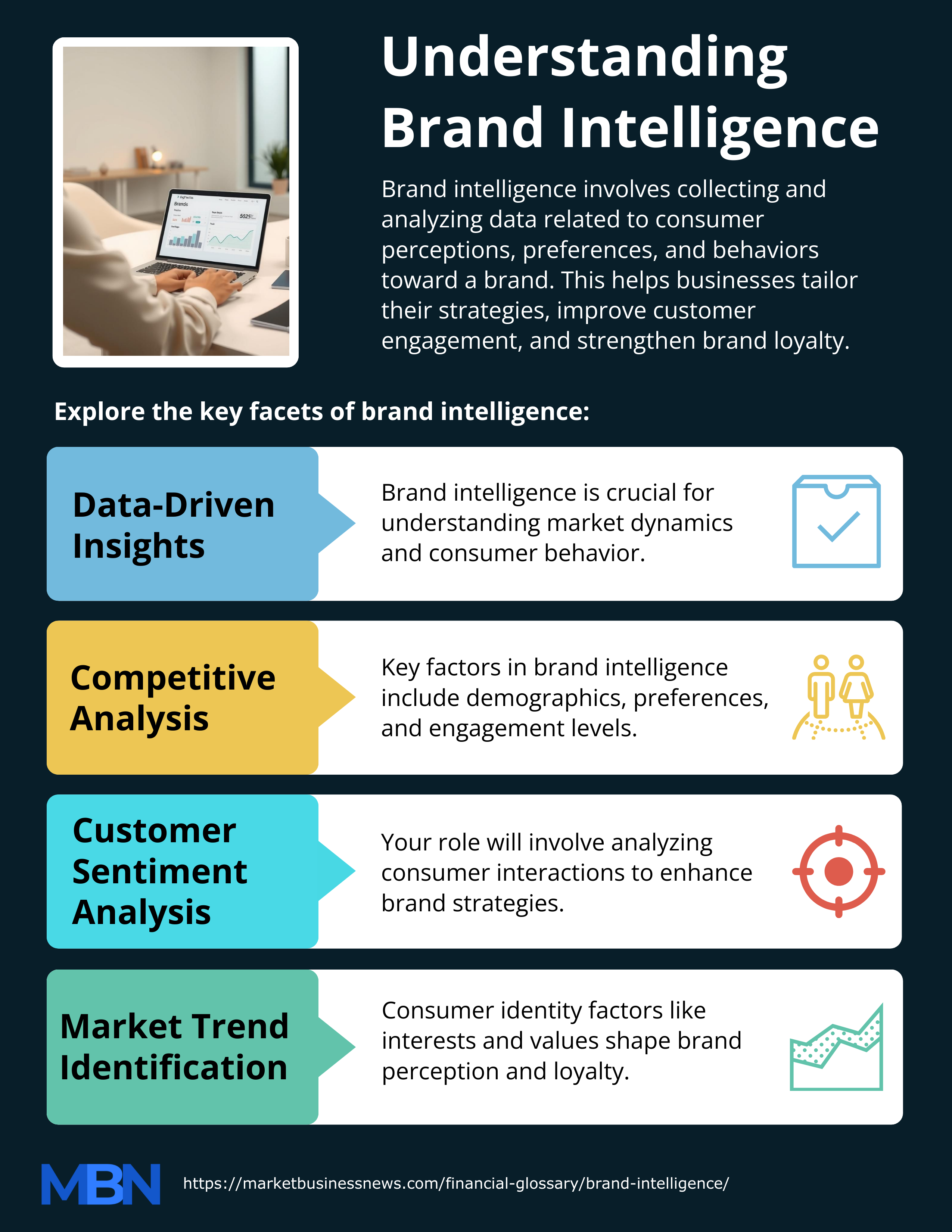Brand intelligence involves gathering and analyzing data related to a brand’s performance, reputation, and presence in the marketplace. The data provide insights into how customers, stakeholders, and consumers perceive a brand and how it stands against competitors.
By understanding brand intelligence, you can make informed decisions that strengthen your brand’s position and improve customer engagement. Ultimately, brand intelligence can help your company sell more.

Tracking Metrics
Brand intelligence involves tracking various *metrics that reflect your brand’s health. These metrics can include customer sentiment, brand awareness, market share, competitive positioning, customer loyalty, digital engagement, product perception, and social media presence.
By analyzing these elements, you can identify strengths, weaknesses, and opportunities for growth.
* Metrics are quantifiable measures used to evaluate the performance, progress, or success of a specific activity or process. In other words, they tell us how well or badly we are doing and whether we are going in the right direction.
Key Elements of Brand Intelligence
Customer Sentiment
One of the key aspects of brand intelligence is understanding customer sentiment. This involves monitoring what customers are saying about your brand across different platforms, such as social media, review sites, blogs, online communities, customer support channels, and forums.
By analyzing this data, you can gauge the overall perception of your brand and identify any issues that may need to be addressed.
Brand Awareness
Brand awareness refers to how well-known your brand is within your target market. High brand awareness means that more people recognize your brand, which can lead to increased customer loyalty, referrals, and sales.
Brand intelligence tools – such as Google Analytics, Brandwatch, and Hootsuite – can help you track changes in brand awareness over time, allowing you to see the impact of your marketing efforts.
Market Share
Market share shows how your brand is performing compared to competitors in the same market.
By understanding your market share, you can identify trends and strategies that can help you gain a competitive edge.
Social Media
Social media platforms offer a wealth of data that can provide insights into how your brand is being discussed and shared.
By analyzing this data, you can understand which aspects of your brand resonate with your audience and which areas need improvement.
Customer Loyalty
To find out how strong the relationship between your brand and its customers is, you must track customer loyalty. This includes monitoring repeat purchases, customer satisfaction, and brand advocacy.
High customer loyalty signifies a strong, positive connection, which can lead to long-term business success. By analyzing loyalty metrics, you can uncover the key drivers of customer retention and develop strategies to further enhance it.
Competitive Positioning
Competitive positioning refers to how your brand is perceived relative to competitors. You will need to gauge factors such as pricing, product quality, and customer satisfaction.
After gaining a better understanding your competitive position, you can make strategic decisions that help *differentiate your brand and attract more customers.
* To differentiate, in this context, means to stand out in a sea of competitors.
Implementation
Implementing brand intelligence involves using various tools and techniques to collect and analyze data.
These tools can range from social media monitoring software, web analytics platforms, competitor analysis tools, sentiment analysis algorithms, CRM systems, to customer surveys and market research reports.
Your goal is to gather comprehensive data that provides a clear picture of your brand’s standing in the market.
Brand Intelligence – Brief History
The concept of brand intelligence, though not always called by that name, has existed since businesses began to recognize the importance of understanding customer perceptions and market positioning, dating back to the early 20th century.
The term “brand intelligence” itself likely entered the English language in the late 20th century as businesses increasingly used data and analytics to gain insights into brand performance.
It began gaining traction as a widely discussed topic in the early 2000s, coinciding with the rise of digital marketing, social media, and advanced data analytics.
As these tools became more sophisticated, the importance of brand intelligence in strategic decision-making grew. Today, it is a key element in marketing and brand management.
Brand intelligence, much like business intelligence, is the aggregate information a company collects about customer sentiment and emotion toward its brand. Once this data is gathered from various sources, companies employ brand and product intelligence tools to analyze it and extract actionable insights. These insights enable organizations to predict customer behavior and enhance performance through improved customer satisfaction, experience, and loyalty.
